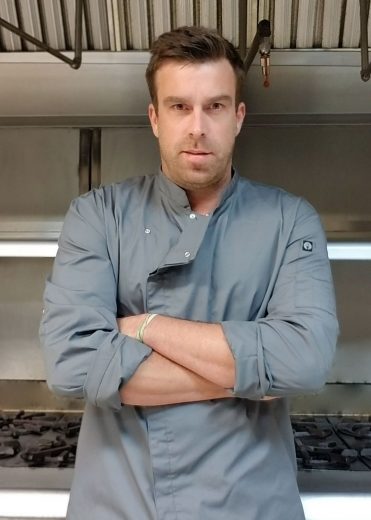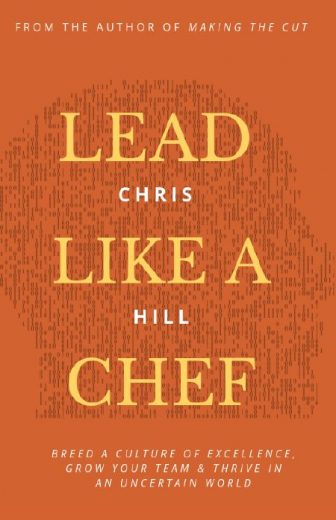
Chris Hill is a chef, author and entrepreneur who is known for having his finger on the pulse of the culinary community. He penned this special blog post exclusively for the Chef Works blog. For more on Chef Hill, visit his website.
By Chris Hill
Once you’ve stepped into the kitchen of a restaurant, I don’t think you’ll ever be quite the same. The hood hums overhead, the staff preps for their shift and the impending energy of a busy weekend rush lingers in the air — equal parts tension and excitement as cooks and dishwashers scurry across the terracotta kitchen tile readying for service. The harmony of a well-run kitchen echoes signs of pride, respect and camaraderie. You earn these things by investing more of yourself than what the average person would deem sane.
If you’re in the early stages of working in the kitchen and are unsure — turn back now. The struggle, the pay, the hours and the commitment it takes to become successful in the industry isn’t worth it unless you feel “the pull” — the same pull felt by so many of us who are convinced that we couldn’t spend our working days doing anything else.

On the other hand, if you’re part of the rare “kitchen-in-your-blood-breed” and want to make a career out of it, be warned. This is advice I wish I had heard when I was first starting out. Every good cook I’ve ever met has a certain level of confidence mixed with ego. There’s a healthy dose of ego. But too much ego will get you in trouble. It’s up to you to look in the mirror and keep that in check.
In the first couple years you can’t help but develop a certain level of expectation and belief in yourself. You have to. If you don’t, you’re in the wrong industry. If you’re good enough, you’ll start to see success unfold in real time. Opportunities will present themselves after years of hard work and it’s easy to get caught up in them. The line out the door, the competition shows, the media and awards and reviews — these are all distractions that are so easy to get wrapped up in. Finally, people are starting to notice and appreciate the hard work. But paying too much attention can lead to a loss of discipline.
When you attach success and your worth as a chef to these external goals (ie. James Beard awards, Michelin Stars, TV shows, reviews), the pressure grows stronger, the load-to-bear gets heavier and the stakes get higher.
Once you earn one star, then it’s two. What about that third? Now you can’t stop until you get there! These are crosses we bear that are handed down from a culture and an industry that defines success by having more money, more creativity and by being just a bit more out of the box than the next person. We then can’t help looking into the mirror and asking: “How do I get better?”
This better isn’t necessarily better than who I was yesterday, but rather, better than some set of expectations the industry has put in place. Measuring success on such a scale makes it unreachable. Success becomes a moving target, always leaving us feeling like we aren’t quite there yet. Even if we get to this place, the demand and toll it takes on us in achieving and attempting to maintain it stands in the way of enjoying the process along the way. This isn’t fair to you. It isn’t fair to the people you work with. It isn’t fair to the people you love at home. And it isn’t fair to the craft.
The drive for greatness can be the birthplace of beautiful, uncharted waters. But the drive should never come at the expense of the reasons why you got into this industry in the first place: to make people happy — your customers your staff and above all else, yourself. That’s truly what it’s all about, whether you’ve got three Michelin Stars, or you’ve got a three-star average on Yelp. It’s about investing in the craft and making people happy.
When you clock out tonight, loosen the apron around your waist and slip it over your head, I hope you’ll take a minute to rethink why you started down this path in the kitchen. Think about what’s gotten you here and how much hard work you’ve put in thus far in your career. Take yourself back to the smell of that first walk-in cooler, the splash of a hot sauté pan sizzling with a piece of cold fish. Think of the first time chef invited you to come up with the daily special and how far you’ve come since then. Remember when you scalded that soup for the first time, the rancid smell accompanying it and how bad the entire crew joked you for it — that stench is stamped in your memory forever.

Remember the fascination you had when you first started to fall in love with the kitchen. You weren’t enamored with it because of awards and accolades. But rather because you got to learn and grow, make people happy and create a bond with the people working alongside you that can be, at times, inseparable.
If you’re looking for an easy path down the road of life, I’d recommend leaving the hard work of the kitchen to someone else. But if you’re looking for a meaningful and selfless way to spend the remainder of your working days here on this earth — the kitchen just might be for you. If you do it right by investing in yourself, staying true to the craft and always reminding yourself of why you started down this path, chances are the external rewards will find you.
Just ask yourself, do you want it to be easy, or do you want it to be great? I know for a fact that a life in the kitchen will lead you to one of these two answers.
Now you just need to answer that question for yourself.
Follow Chef Chris Hill on Facebook and Instagram.



Very well said
Awesome read as i sit 25 years in the industry an love every aspect once again. Thank you